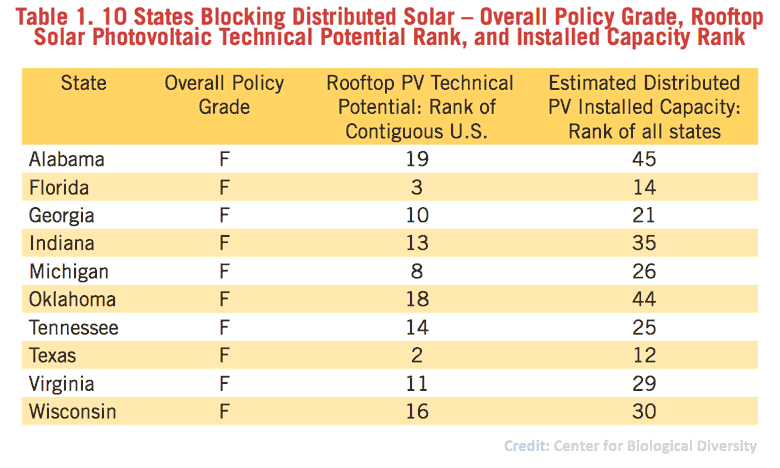Virginia Makes Top 10 ‘Worst List’ for Solar Development
By Karen Schaufeld
Virginia is one of the 10 states included in the “Throwing Shade: 10 Sunny States Blocking Solar Development” report by The Center for Biological Diversity (CBD), a group known to advocate for laws to protect the environment and ecological diversity that has recently begun focusing on solar and other renewable energy policy.
The report listed the 10 states with high solar potential that are blocking distributed solar development. These states, according to a story by Herman K. Trabish in Utility Dive, “hold 35% of total solar potential in the United States, but only account for 6% of the nation’s total installed capacity.” Trabish writes that while, “across most of the nation, it’s clear solar power is taking off . . . some states are lagging behind and are holding on to policies that cramp growth instead of nurturing it.”
CBD looked at specific metrics to create its report, so, for example, it doesn’t include Georgia’s strides in 2015 to make up for its deficits in the area of solar. Knowing that some lists will differ, here’s what it said about the Commonwealth (p.24):
Quick Facts
#11 in technical potential for rooftop solar
#29 in installed capacity (MW of distributed solar)
Overall policy grade: F
Renewable portfolio standard: Voluntary and weak
Net-metering policy: Weak
Third-party ownership: Unclear
Community solar laws: None
This should come as no big surprise to Powered by Facts readers, but it is still disappointing to be in this particular Top 10 list.
Here are some of the highlights about the Top 10 worst states from the Throwing Shade report:
Seven of the top 10 states blocking distributed solar lack mandatory renewable portfolio standards (RPS), policies that are key to creating a safe market for investing in rooftop solar.
Three lack mandatory statewide net-metering policies, possibly the most important policy model in place in the United States that allows solar customers to connect with the grid.
Only three allow for third-party ownership of solar panels — a financing model that has fostered a distributed solar boom across the United States by allowing for those who wouldn’t otherwise be able to afford solar panels outright to be able to install them on their property.
None have community solar programs in place, which are a key policy to encourage access to distributed solar resources and ensure community resiliency.
Nine lack strong interconnection laws, making the process of installing solar panels harder for homeowners, business owners and third-party companies alike.
Five don’t have any solar-access laws that protect home and business owners from local restrictions on solar panel installations due to issues such as neighborhood aesthetics.
Finally, according to the report, “all 10 of these states are bad actors in the distributed solar policy game, but two in particular stand out as the worst: Florida and Texas.” So at least Virginia has that.
